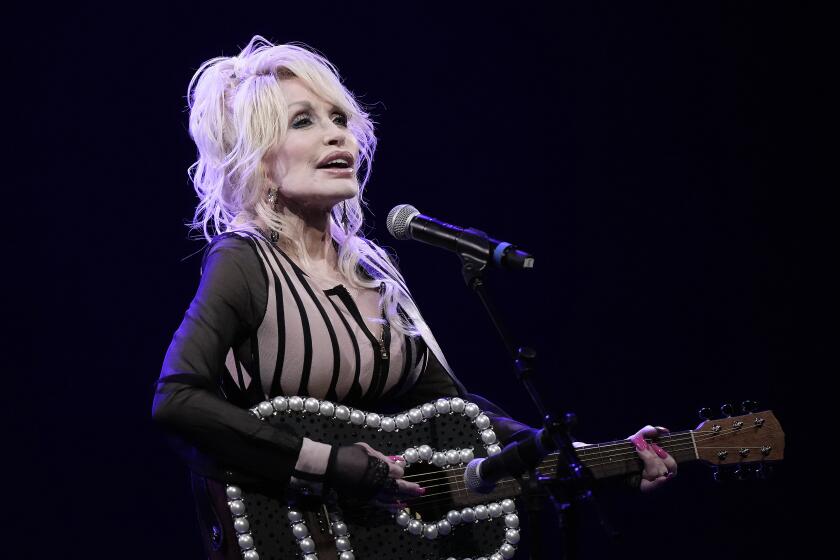MGM Tries on ‘Urban’ Mantle
- Share via
At the First AME Church in South-Central Los Angeles a few weeks ago, some aspiring black film entrepreneurs caught Metro-Goldwyn-Mayer Co.’s Chris McGurk off guard with a line of questioning that began: “Now that MGM has established itself as the leading urban studio ... .”
Only last fall, MGM was wrangling with activists offended by the studio’s smash hit “Barbershop,” with its jabs at African American icons Rosa Parks and Martin Luther King Jr. That an audience as finely attuned to community sensibilities as the First AME’s was ready to see the company as a black cultural outpost surprised McGurk -- who resolved to prove them right.
Since his encounter at the church, MGM’s lanky, blond vice chairman has been quietly pushing his studio to capitalize on its new presence among blacks by developing a signature as Hollywood’s premier stop for urban filmmakers.
“A light went off in my head,” said McGurk, who joined MGM in 1999 after holding high-level jobs at Universal Pictures and Walt Disney Studios. “We’ve been attempting to find a way to define ourselves. But the movies were already defining us.”
Now MGM is looking for a new array of employees and vendors with a fix on both the African American market and the broader audience that sometimes follows it. The idea is to support a steady stream of black-oriented productions and development projects that already includes “Foxy Brown,” a reprise of the 1974 cult picture, with Halle Berry as both star and producer, and “Double Man,” billed as the “first African American superhero,” from director Antoine Fuqua.
The company already had mounted a “Barbershop” sequel with star Ice Cube, set for release in November, and is lining up a spinoff, called “Beauty Shop,” with Queen Latifah.
MGM also has in the works a Denzel Washington police drama and films to be produced by Morgan Freeman, Master P, Cuba Gooding Jr. and others.
Not everyone in Hollywood is sold on MGM’s targeted approach, which grows from the studio’s overall plan to focus on less-costly films, looking for hits that might spawn bigger sequels. “It’s a good idea for a start-up,” said one competing studio chief.
Every studio, moreover, has had its share of black-driven hits, including 20th Century Fox’s “Waiting to Exhale,” which took in $67 million at the box office in 1995, and New Line Cinema’s lucrative “Friday” series.
A few have even briefly seemed poised to assume the mantle of urban leadership -- perhaps paralleling black music powerhouses such as Universal’s Interscope and Island Def Jam labels -- only to have the effort founder amid disappointments and distractions. Thus, Sony Pictures Entertainment, following its success a decade ago with “Boyz N the Hood,” invested heavily in deals with the picture’s director John Singleton and black comic Damon Wayans. Neither made a permanent mark at the studio.
One veteran Hollywood player, who declined to be identified, said he believed studios ultimately lose interest in black films because the material is so remote to most well-heeled, white executives. “When these people go home, they’ve been working on something that doesn’t really apply to their lives,” said this person, who has been involved with black-driven projects at several major studios.
Lately, News Corp.’s Fox Searchlight, which released “Antwone Fisher,” Vivendi Universal’s Focus Features, which released “Deliver Us From Eva,” and Sony’s Screen Gems, which has scheduled “The Break Up Handbook” starring Jamie Foxx for next year, are said to be aggressively pursuing black-oriented pictures.
Such companies have found urban films increasingly attractive, particularly when budgets are kept low, because they can be targeted at a narrow but potentially potent audience, and then eased into the wider marketplace when they show drawing power. “It’s a rifle shot rather than a shotgun,” McGurk said.
The downside, according to McGurk and others, is that black-driven pictures continue to underperform in most foreign markets. The recent explosion in DVD revenue, however, has made it easier for studios to recoup their costs on modestly budgeted urban pictures even when they don’t win the white audience -- as did “Barbershop,” which took in $75 million at the U.S. box office.
If the underlying economics are improving, some observers nonetheless believe MGM and others will overcome the challenge of consistency only when they realize that the black audience is powerful precisely because it is roiling with change.
“They’re going to have to be able to figure out what the next thing is,” said Damon Lee, a former MGM executive and now president of Urban Entertainment, which produced “Undercover Brother” for Universal. “What’s the next sweet spot in the urban audience? Is it going to be the thriller? What is it?”
Cassandra Butcher, a publicist who has handled black-oriented projects for studios since the early 1990s and now works closely with MGM, said that studios have failed when they assumed that the African American audience is static. “You have to continuously change those templates,” she said.
But to Robert Teitel, who is co-producing the “Barbershop” films and other MGM projects with partner George Tillman Jr., such nuances are less important than simple resolve to find what he calls “universal themes” in films, black-oriented or otherwise, and stand by them.
In defending the cultural self-critique of “Barbershop” when the controversy arose, said Teitel, McGurk earned the respect of an urban audience that gave him not just a hit, but a shot at leadership. “He grabbed the mike and spoke up. He stood his ground,” said Teitel. “I think that helped him, big-time.”
More to Read
The biggest entertainment stories
Get our big stories about Hollywood, film, television, music, arts, culture and more right in your inbox as soon as they publish.
You may occasionally receive promotional content from the Los Angeles Times.










